War between Georgia and Russia was result of political failure
War between Georgia and Russia was result of political failure
The recent war between Georgia and Russia came about through political failure on the part of all of the authorities involved. None of them really appears to have wanted to avoid war. The war cost hundreds of lives and saw many more wounded, tens of thousands forced to flee, residential areas bombed flat, shops looted and villages systematically burned to the ground. And the worst relations between Russia, Europe and the United States since the end of the Cold War. This is what SP Senator Tiny Kox was able to confirm following a fact-finding mission to Russia, Georgia and South Ossetia.
Kox was there as part of a nine-person delegation from the Parliamentary Assembly of the Council of Europe (PACE), within which he is chair of the United European Left group (known from its French acronym as the GUE). The assembly will debate the consequences of the war between Georgia and Russia at its meeting in Strasbourg this week and the mission was in preparation for this debate. Georgia and Russia are both members of the Council of Europe and their war was in breach of their treaty obligations.
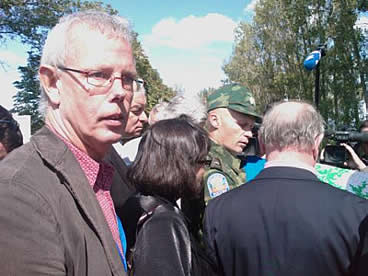
Senator Kox on the border Georgia and South Ossetia
The delegation held a large number of meetings with the political and military authorities involved in the war, with aid workers from the Red Cross and United Nations and with human rights organisations such as Amnesty International and Human Rights Watch. In addition, the delegation spoke with numerous members of the public in the areas affected by the war. It was the first time that the government of the seceded Georgian province of South Ossetia had granted an international delegation access to its territory via Georgia, a decision taken under pressure from Russia. The South Ossetian President Eduard Kokoity's threat was that it would also be the last. His government wants nothing more to do with Georgia following the latter's bombardment of the South Ossetian capital, Tsinvali, which on August 8th saw the start of a short but intense war.
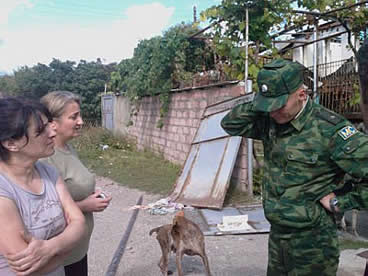
Ossetian women speaking to a Russian general
Georgian authorities deny that their country began the war, although on 8th August Georgian President Mikheil Sakaasvili announced that his army had decided “to restore the constitutional order” in the seceded province. The Georgian President said later that his army had just learnt that Russian troops from the north had invaded South Ossetia. Of this, however, there appears to be no proof. Nor does there appear to be any evidence behind his third declaration, that Georgia intervened only after an ethnic cleansing of Georgian inhabitants was under way in South Ossetia. It seems to be confirmed that large numbers of Georgians were forced to flee, but this happened after the war had begun, not beforehand. The Russian authorities point to the fact, therefore, that their own version of events is the most consistent. Immediately after Georgia began its bombardment of Tsinvali and Georgian troops began to fire on Russia soldiers stationed in South Ossetia under a UN peacekeeping mandate, reinforcements were sent from Russia. The Russian army ended the Georgian attack and then pressed on to Georgian targets in order to break the power of the Georgian armed forces. After this Russia was prepared to accept the proposal of French President Nicolas Sarkozy for an end to the war. Shortly afterwards Russia withdrew its troops from Georgia.
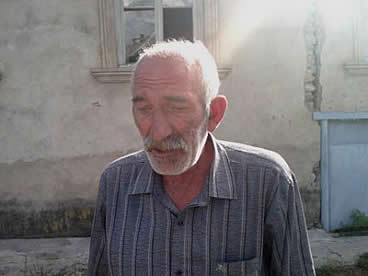
House bombed, family dead...
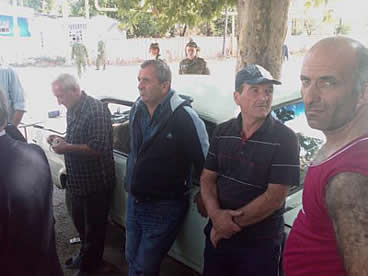
Georgian men in front of a looted shop
In the meantime Russia recognised the independence of South Ossetia, as well as the other seceded province, Abkhazia. Russia will, at the request of both provinces, station troops in the two newly-recognised countries in order to protect them from a possible further Georgian attack. Russian authorities told the Council of Europe delegation that no other choice remained to them. For fifteen years Russia had refused to recognise the two rebel provinces, but after the latest Georgian attack they had had enough. Russia regretted that the war had been blamed on them by the US and Europe and that international relations were tense as a result. Moscow blamed the United States for its arming and training of the Georgian army and believed that it had probably put the Georgians up to their irresponsible attack on South Ossetia. The Russians also had major doubts about the involvement of other NATO countries and the plan to make Georgia a NATO member. Other people with whom the PACE delegates spoke in Moscow and Tbilisi believe, however, that Russia wanted also to teach Georgia a lesson, in order in addition to prevent unrest in Russian regions in the North Caucasus, such as North Ossetia, Chechenye and Dagestan. Russia was involved for years in a bloody civil war in Chechenye. Though peace seems to have been restored, the situation in the North Caucasus cannot in any sense be seen as stable.
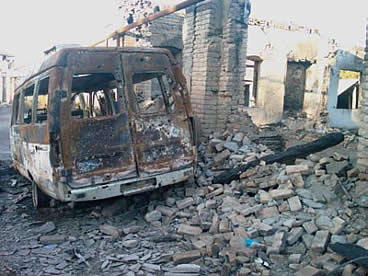
Bombardment of South Ossetia. Below the remains of the parliament buildings
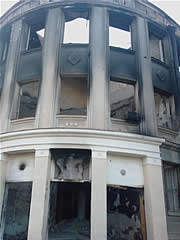 People in the area affected by the war told the delegation about the bombardment which had destroyed their houses and killed their families and neighbours, about the looting and systematic burnings which led to the mass flight into Georgia. Georgian inhabitants of the region were greatly afraid of South Ossetian militias which the Russia army was doing too little to protect them from, which under the international law of war they are duty-bound to do. Many villages were depopulated and those people remaining, for the most part elderly women and men, were spending their nights sleeping outside, in orchards, terrified of looters. Inhabitants of Tsinvali showed the delegation how Georgian grenades and rockets had destroyed their homes. In Tsinvali, also, the parliament buildings were bombed and the public library obliterated. Although President Kokoity claims that the bombardment cost the lives of 1,600 victims, this seems to have been an exaggeration, and the number of dead to have been a few hundred.
People in the area affected by the war told the delegation about the bombardment which had destroyed their houses and killed their families and neighbours, about the looting and systematic burnings which led to the mass flight into Georgia. Georgian inhabitants of the region were greatly afraid of South Ossetian militias which the Russia army was doing too little to protect them from, which under the international law of war they are duty-bound to do. Many villages were depopulated and those people remaining, for the most part elderly women and men, were spending their nights sleeping outside, in orchards, terrified of looters. Inhabitants of Tsinvali showed the delegation how Georgian grenades and rockets had destroyed their homes. In Tsinvali, also, the parliament buildings were bombed and the public library obliterated. Although President Kokoity claims that the bombardment cost the lives of 1,600 victims, this seems to have been an exaggeration, and the number of dead to have been a few hundred.
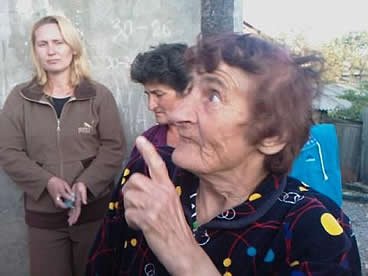
An elderly woman in a bombed residential area of Tsinvali
In Georgia itself there are major fears regarding the fate of the refugees newly streaming in. These fears are more than justified, given the deplorable conditions in which more than 100,000 people who fled South Ossetia and Abkhazia fifteen years ago at the time of the last armed conflicts there are forced to live. Aid workers speak of the scandalous way in which the Georgian government has simply left these refugees to their fate.
The Council of Europe delegation will this weekend file its report and on Monday inform the parliamentary assembly of its findings. On Tuesday and Thursday 350 members of parliament from forty-seven countries will discuss the consequences of the war between Georgia and Russia and consider what measures might be taken against the two member states.
